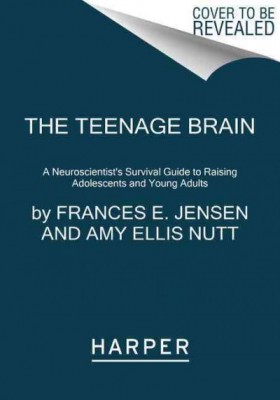| The Teenage Brain: A Neuroscientist's Survival Guide to Raising Adolescents and Young Adults Contributor(s): Jensen, Frances E. (Author), Nutt, Amy Ellis (Author) |
|||||||
 |
ISBN: 0062067850 ISBN-13: 9780062067852 Publisher: Harper Paperbacks
WE WILL NOT BE UNDERSOLD! Click here for our low price guarantee Binding Type: Paperback - See All Available Formats & Editions Published: January 2016 |
||||||
| Additional Information |
| BISAC Categories: - Psychology | Developmental - Adolescent - Family & Relationships | Life Stages - Teenagers - Family & Relationships | Life Stages - Adolescence |
| Dewey: 612.640 |
| LCCN: 2014009600 |
| Physical Information: 1" H x 5.2" W x 7.8" L (0.65 lbs) 384 pages |
| Features: Price on Product |
| Descriptions, Reviews, Etc. |
| Publisher Description: A New York Times Bestseller Renowned neurologist Dr. Frances E. Jensen offers a revolutionary look at the brains of teenagers, dispelling myths and offering practical advice for teens, parents and teachers. Dr. Frances E. Jensen is chair of the department of neurology in the Perelman School of Medicine at the University of Pennsylvania. As a mother, teacher, researcher, clinician, and frequent lecturer to parents and teens, she is in a unique position to explain to readers the workings of the teen brain. In The Teenage Brain, Dr. Jensen brings to readers the astonishing findings that previously remained buried in academic journals. The root myth scientists believed for years was that the adolescent brain was essentially an adult one, only with fewer miles on it. Over the last decade, however, the scientific community has learned that the teen years encompass vitally important stages of brain development. Samples of some of the most recent findings include:
Dr. Jensen gathers what we've discovered about adolescent brain function, wiring, and capacity and explains the science in the contexts of everyday learning and multitasking, stress and memory, sleep, addiction, and decision-making. In this groundbreaking yet accessible book, these findings also yield practical suggestions that will help adults and teenagers negotiate the mysterious world of adolescent development. |
Contributor Bio(s): Nutt, Amy Ellis: - Amy Ellis Nutt is a science journalist at the Washington Post and the recipient of a Pulitzer Prize in feature writing. Her most recent book is Becoming Nicole: The Transformation of an American Family. Jensen, Frances E.: -Frances E. Jensen, MD, is Professor and Chair of the Department of Neurology at the Perelman School of Medicine, University of Pennsylvania. She was Professor of Neurology at Harvard Medical School, Director of Translational Neuroscience and Director of Epilepsy Research at Boston Children's Hospital, and Senior Neurologist at Boston Children's and Brigham and Women's Hospitals. She lectures widely about the teen brain at science museums, TEDMED, and high schools. |
| Customer ReviewsSubmit your own review |
| To tell a friend about this book, you must Sign In First! |